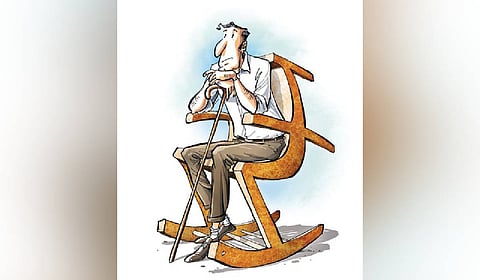The active life of the retired soul
Many WhatsApp groups boast people who are in their second innings after a long tenure in a formal organisational setting. If these groups are overloaded and super-saturated with wisdom, intellectual precepts, revolutionary ideas and transformatory prescriptions, the credit should go to these veterans. Some of them will wake up diligently everyday, as early as 3 am, and conscientiously pour their freshly minted postulates in their groups. Those who have spells of nocturnal awakenings utilise such time to make serious interventions on the discussions held in the group late at night.
Why are the retired more active, creative, outspoken, and daring about what is happening in polity, economy, civic affairs and particularly about their own past work establishment? Is it because they never had any time during their career to think about and react to such things which they thought to be mundane? Or is it because they were fettered by the organisational conduct rules and scared of the Big Brother watching? This is partially true for the corporate retirees.
However, unlike the ex-babus they are careful in venting out their rage and anguish against the past establishment. Government retirees seem to be harsher than their corporate counterparts who have lesser dents in their organisational loyalty, when it comes to criticising their past organisation.
Why are the best ideas curated by someone only when he or she is no longer in a powerful position or service?
“It is not that we had kept our brains in cold storage while we were in the seats. Our ideas just couldn’t fit in the scheme of things at that time”—an officer who was a repertoire of out-of-the-box ideas, strategically quipped, perhaps on behalf of many similarly placed officers. It is quite interesting to observe that such pathbreaking suggestions to transform the bureaucracy gush out from many creative veterans immediately after retirement, the way the floodgates of a dam are thrown open during heavy rains.
They dissect every government policy, detect each loophole, diagnose every pathology in the system, describe how things should have been done better and demand stern action against the defaulters. If Trump’s DOGE (Department of Government Efficiency) idea is considered for replication in India, the core team can constitute not only ex-CXOs, but also these vibrant former bureaucrats.
How to channelise the post-retirement revelations and revolutionary ideas of people? Will the proponents fit in for an advisory role in one of their own past organisations? Will they get into a systemic trap again, and play to the whistle?
Undoubtedly, the younger colleagues can be immensely benefited by the invaluable tips and good advice stemming from the experiences of the retired seniors. Since some of those ideas for improvement emanate from their own introspection, regrets, anguish and disillusionment and are sincerely aimed at ushering in a better tomorrow, they are invaluable action points for the serving leaders.
If at all, the younger counterparts may gain necessary courage to take them forward even at the risk of losing a plush posting or a post-retirement opportunity. Otherwise, after enjoying their extended privileges, they may also retreat into the pastime of blowing the whistle without a uniform, just like most of the night owl retirees.
Sibichen K Mathew
Author and Civil Servant
sibi5555@gmail.com

